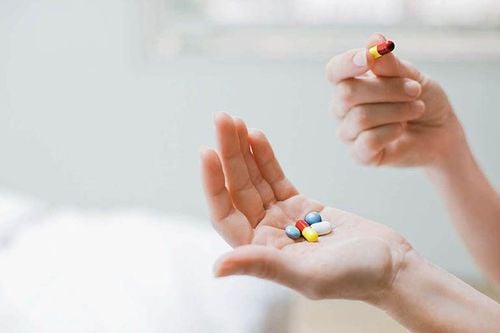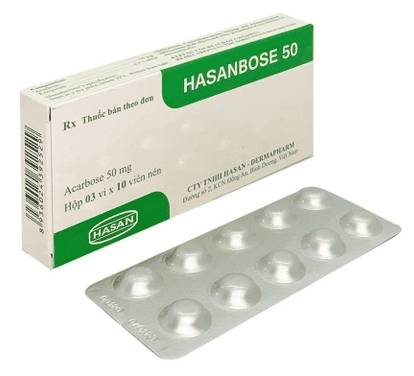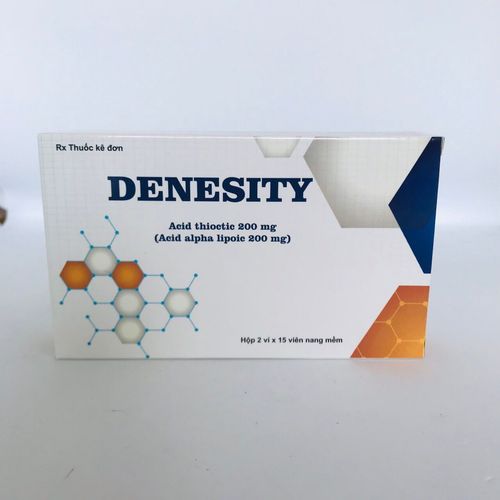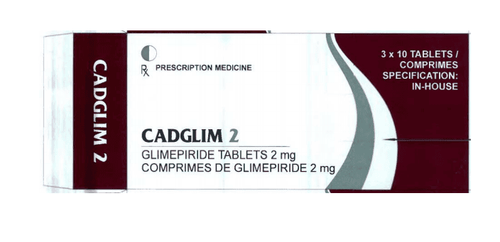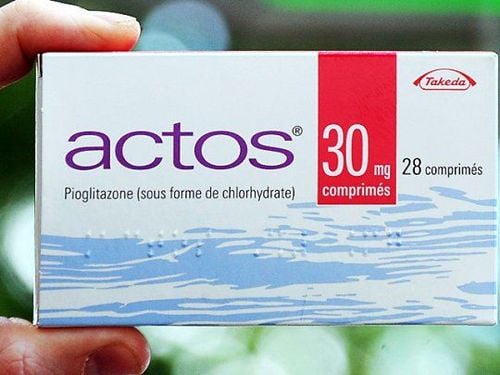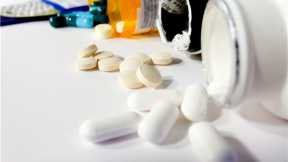This is an automatically translated article.
Acarbose is a diabetes medicine that comes in pill form and is usually taken three times a day by people with diabetes. This is a medicine that must be taken before each main meal. You must follow the instructions for using Acarbose exactly according to your doctor or pharmacist. In this article, we will provide useful information for you to better understand the uses, indications and precautions when using Acarbose.
1. Acarbose
Acarbose is often used by doctor's prescription for patients with type 2 diabetes as monotherapy when diet and exercise are not effective, in combination with other oral hypoglycemic agents. Medicines to help lower your blood sugar along with diet and exercise. Acarbose belongs to a class of drugs known as alpha-glucosidase inhibitors. It works by slowing the action of certain enzymes that break food down into sugar. This slows the digestion of carbohydrates to keep your blood sugar from rising too high after you eat.
Controlling blood sugar helps prevent kidney damage, blindness, nerve problems, quadriplegia or sexual problems. Plus, good blood sugar control reduces the risk of heart attack and stroke.
The drug is prepared in the form of capsules of 25 mg, 50 mg, 100 mg.
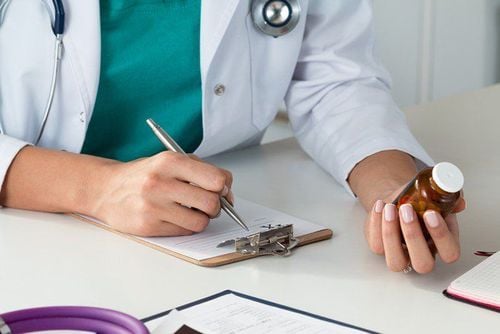
Acarbose thường được sử dụng theo đơn của bác sĩ
2. Usage
Take the drug by mouth, starting dose 25mg / time x 3 times a day before each main meal or as directed by the doctor. The dosage is based on your medical condition, weight, and response to therapy. Your dose may be gradually increased to determine the most effective dose for you.
Do not crush the tablet as it can cause serious stomach problems such as bloating or stomach pain.
The manufacturer recommends that you take no more than 300 milligrams per day, and use this medication regularly to get the most benefit from it.
Combine exercise, reasonable diet and check blood sugar, urine regularly as directed by the doctor.
* Special dose
For people weighing 60 kg or less: the maximum dose is 50 mg x 3 times/day before each main meal. You may be at risk of elevated liver enzymes while taking these drugs For people with poor kidney function: If your kidney function falls below certain limits, your doctor may stop your treatment and switch you to another medication. more suitable for diabetes.
3. Contraindications
All patients are hypersensitive to acarbose and other components of the drug Acarbose is not an effective treatment for diabetic ketoacidosis. Patients with cirrhosis or chronic hepatitis, elevated liver enzymes Hypoglycemia Acarbose is contraindicated in patients with inflammatory bowel disease, ulcerative colitis, ileal disease, partial or predisposition to GI obstruction, or associated GI disease. related to malabsorption or digestion. It is not recommended to use acarbose in patients with creatinine clearance (CrCl) less than 25 mL/min or serum creatinine more than 2 mg/dL, including patients with renal impairment. Do not use acarbose for pregnant and lactating women unless absolutely necessary

Không sử dụng acarbose cho phụ nữ có thai
4. Side effects
4.1. Common Side Effects Gastrointestinal Common
Abdominal Pain Diarrhea Flatulence These side effects usually develop during the first few weeks after taking acarbose. They should decrease as your body gradually adapts to the medication, usually within a few days or weeks. Notify doctor if symptoms get worse
4.2. Serious side effects Allergic skin reactions: Rash, redness, swelling Fever, trouble breathing, chest tightness Swelling of your mouth, lips, face, tongue or throat Jaundice, yellow eyes Stomach pain Cystoides pneumonia gutis: Gas-filled cysts on the wall of your intestines, causing intestinal problems, such as a blockage or bleeding. Symptoms include: diarrhea or constipation, rectal bleeding, mucus discharge. Go to the nearest medical facility immediately if you have any of the above symptoms.
5. Drug interactions
5.1. Other diabetes medications When you take certain diabetes medications other than acarbose (such as glyburide or glimepiride, insulin) your blood sugar may drop too low, causing hypoglycemia. Signs of hypoglycemia may include fast heartbeat, confusion, hunger, sweating, shaking, or feeling weak and dizzy.
Use glucose tablets or liquid glucose to help control hypoglycemia while you are taking acarbose. Cane sugar (sucrose) will not treat hypoglycemia while you are taking acarbose. Use oral products (dextrose) instead.
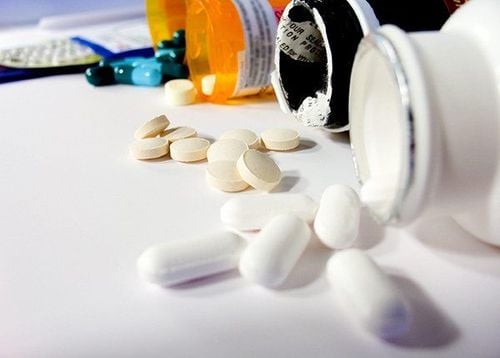
Sử dụng thuốc tiểu đường khác với acarbose có thể gây hạ đường huyết
5.2 Thyroid medication Use glucose tablets or liquid glucose to help control hypoglycemia while you are taking acarbose. Cane sugar (sucrose) will not treat hypoglycemia while you are taking acarbose. Use oral products (dextrose) instead.
5.3. Estrogens and birth control pills Taking some of the following hormone medications along with acarbose can affect your blood sugar.
Norgestimate Levonorgestrel Norethindrone Drospirenone 5.4. Diuretics Taking acarbose with certain medications that dehydrate the body can lead to your blood sugar getting too high, leading to hyperglycemia.
For example:
Thiazide diuretics: Hydrochlorothiazide, chlorthalidone Loop diuretics: Furosemide, bumetanide, torsemide 5.5. Corticosteroids Taking acarbose with corticosteroids can cause your blood sugar to rise too high, leading to hyperglycemia.
Drugs include: hydrocortisone, prednisolone, prednisone, methylprednisolone.
5.6. Antipsychotics Taking chlorpromazine with acarbose might cause your blood sugar to rise too high, leading to hyperglycemia.
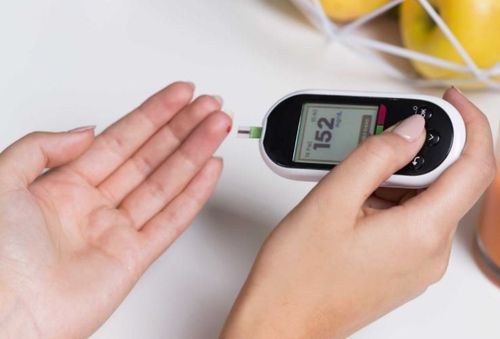
Sử dụng acarbose chung với thuốc chống loạn thần có thể khiến tăng đường huyết
5.7. Seizure medications Some seizure medications like phenytoin, fosphenytoin with acarbose can affect your blood glucose readings
5.8. Nicotinic acid Taking niacin along with acarbose might cause your blood sugar to rise too high, leading to hyperglycemia.
5.9. Sympathomimetic drugs Some sympathomimetic drugs taken with acarbose can affect your blood sugar including: pseudoephedrine, phenylephrine
5.10. Blood pressure medications Beta-blockers can delay too long for your blood sugar to return to normal, and it also takes away signs of low blood sugar such as a higher-than-normal heart rate. often, palpitations, tremors.
Some examples of blood pressure medications in this class include: metoprolol, bisoprolol, atenolol, nadolol, propranolol
5.11. TB medicine Taking acarbose with isoniazid also causes high blood sugar.
5.12. Cardiovascular drugs Taking digoxin with acarbose can change the level of digoxin in your body. If you take these medicines together, your digoxin dose may need to be adjusted by your doctor.
5.13. Other Acarbose may interfere with iron absorption or metabolism
6. Preservation of drugs
Store at room temperature < 25oC, avoid low humidity and high temperature, direct light. It's better to ask your doctor or pharmacist how best to store your medicine. Keep it in a safe place, out of reach of children and pets. Do not use expired, modified or no longer need the medicine. Do not throw medicine in the toilet or flush it down the sewer line
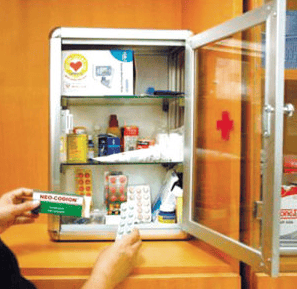
Bảo quản thuốc ở nơi an toàn và tránh xa tầm tay với của trẻ
7. What to do if you forget your medicine
If you forget to take acarbose before a meal and you are still eating it, take it while you are still eating. If you remember the missed dose after eating, skip the missed dose. This medicine will not work unless you take it with a meal.
At the time of your next dose, take only one dose. Never try to get a full dose by taking two tablets at once. This can lead to dangerous side effects.
8. Note when taking medicine
Inform your doctor of any health problems you are having; any medications you are taking, including prescription drugs, multivitamins and minerals, as well as herbal supplements. For people with diabetic ketoacidosis: Diabetic ketoacidosis is a serious condition that can lead to unconsciousness and potentially death. Symptoms of this condition develop slowly. These include dry mouth or extreme thirst, high blood sugar, and frequent urination. If you start vomiting and suspect you have the condition, call your doctor or go to the hospital right away. This condition can be life-threatening within hours of vomiting. If you don't take acarbose as prescribed by your doctor, you may not be able to control your blood sugar. This can lead to dangerous complications from uncontrolled diabetes. These include nerve damage, heart disease, heart attack, stroke, and damage to your eyes and kidneys. Do not drink alcohol and use stimulants while taking the drug. The medicine does not make you drowsy, so you can still drive or function normally. Check blood sugar and blood sugar regularly while taking medication Always carry oral products (dextrose) in case of hypoglycemia. Any questions that need to be answered by a specialist doctor as well as customers wishing to be examined and treated at Vinmec International General Hospital, please contact the Website for the best service.
Please dial HOTLINE for more information or register for an appointment HERE. Download MyVinmec app to make appointments faster and to manage your bookings easily.
References: medicinenet.com, pdr.net, healthline.com




